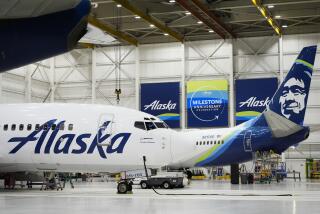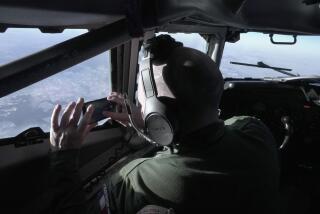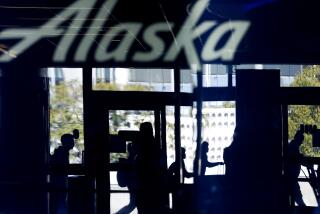Northwest Planned to Disclose Bomb Threat at the Gate
NEW YORK — Northwest Airlines did not plan to notify passengers of a bomb threat against its Paris-to-Detroit flight until they arrived at the boarding gate today, airline officials said Friday. But after the threat was disclosed in a Swedish newspaper, the airline made it public Thursday, two days in advance of today’s scheduled departure, officials said.
As many as 30 passengers are said to have asked for a different flight, according to the Associated Press. However, many passengers are still unaware of the threat and will only find out today when they arrive at the gate, Northwest officials said.
The predicament of Northwest Flight 51 illustrates dilemmas facing all airlines when terrorist threats are made. Most, including Northwest, say they will inform passengers in advance as a matter of policy. However, such publicity could hurt the ability of authorities to investigate the threats.
But in most cases, notification well in advance is often impossible because threats usually come only moments before flights are scheduled to depart. Most threats turn out to be hoaxes.
“If we get to the point where we felt there was a possibility of serious harm toward a passenger or a plane, we would then make a public announcement,” said Donald Morrison, a spokesman for Trans World Airlines.
The controversy heated up about a year ago when Pan American World Airways Flight 103 was blown up over Lockerbie, Scotland, killing 259 passengers. The Federal Aviation Administration had learned about a threat to a Pan Am flight between West Germany and the United States based on a single phone call. But the phone call was later termed a hoax by the airline, and Pan Am did not inform passengers.
What makes the Northwest case somewhat different is that the threat was made so much before flight time, giving authorities more time to investigate and beef up security.
Northwest won’t say when it got the threat. But when it did, the airline said, it immediately notified authorities.
When a newspaper in Sweden ran a story that there had been a threat against the flight, it triggered an agreement between the Minneapolis-based carrier and U.S. and French government authorities. The agreement specified that if there were any leaks about the threat, the airline could also make it public.
“We were working with the Central Intelligence Agency, the Federal Bureau of Investigation, the State Department and French law enforcement agencies,” said Bob Gibbons, a Northwest spokesman. “Their recommendation was to keep the threat as private as possible for as long as possible. In their view it was better to investigate in private than to have high public attention and we agreed.”
Most of the 130 people who have reservations on the DC-10 for Detroit and San Francisco won’t find out about the threat until they get to the airport anyway. Gibbons said it is very difficult to reach people and that some passengers may not be aware of news reports.
Northwest won’t detail any of what it labeled as “heightened security precautions” on all of its transatlantic flights.
“If the good guys want to catch the bad guys, then the good guys cannot tell the bad guys everything they are doing,” Gibbons said.
Northwest says the publicity has not affected other overseas or domestic flights, because the threat was directed at a specific flight and because attention has been drawn to additional security precautions being taken.
The final decision on whether the plane departs will be the pilot’s, Gibbons said.
Airlines willing to discuss security measures say they generally notify passengers if threats are taken seriously.
American Airlines said it takes every bomb threat seriously and evaluates each case. Delta Air Lines spokesman Jim Lundy said that “when we get a threat and we consider it as being serious we make every attempt to keep the passengers informed.”
But the airlines say there are so many threats that each one must be analyzed. FAA spokesman Robert Buckhorn said there are more than 300 bomb threats a year, and most of them turn out to be hoaxes.
“When we get a threat we almost always unload the passengers, unload the bags, we advise passengers of the security situation and allow them to choose an alternative,” Northwest’s Gibbons said.
A Pan Am spokeswoman, Pam Hanlon, said late Friday that the airline always had a policy of informing passengers of bomb threats when they are against specific airlines and when they are considered serious. This, she insisted, has been the airline’s policy both before and after the Lockerbie tragedy on Dec. 21, 1988.
More to Read
Sign up for Essential California
The most important California stories and recommendations in your inbox every morning.
You may occasionally receive promotional content from the Los Angeles Times.










